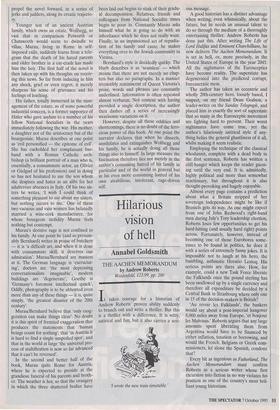Hilarious vision of hell
Annabel Goldsmith
THE AACHEN MEMORANDUM by Andrew Roberts Weidenfeld, £15.99, pp. 280 It takes courage for a historian of Andrew Roberts' proven ability suddenly to branch out and write a thriller. But this is a thriller with a difference. It is witty, satirical and fun, but it also carries a seri- 1 wrote the new train timetable.' ous message.
A good historian has a distinct advantage when writing, even whimsically, about the future, but he needs an unusual talent to do so through the medium of a thoroughly entertaining thriller. Andrew Roberts has done just this. After writing The Life of Lord Halifax and Eminent Churchillians, he now delivers The Aachen Memorandum. It is set in hell, or, more precisely, in the United States of Europe in the year 2045. All the nightmares of the Eurosceptics have become reality. The superstate has degenerated into the predicted corrupt, bureaucratic mess.
The author has taken an eccentric and wholly 20th-century hero, loosely based, I suspect, on my friend Dean Godson, a leader-writer on the Sunday Telegraph, and placed him in exactly the sort of superstate that so many in the Eurosceptic movement are fighting hard to prevent. Their worst nightmares have come true, yet the author's hilariously satirical style if any- thing belies the general ghastliness of it all, whilst making it seem realistic.
Employing the technique of the classical whodunnit, complete with a dead body in the first sentence, Roberts has written a cliff-hanger which keeps the reader guess- ing until the very end. It is, admittedly, highly political and more than somewhat reactionary, but throughout it is also thought-provoking and hugely enjoyable.
Almost every page contains a prediction about what a Britain stripped of her sovereign independence might be like if Brussels gets its way. As one might expect from one of John Redwood's right-hand men during July's Tory leadership election, Roberts loses few opportunities to get his hard-hitting (and usually hard right) points across. Fortunately, however, instead of becoming one of those Eurobores some- times to be found in politics, he does it with a series of extremely funny jokes. It is impossible not to laugh at his hero, the bumbling, asthmatic Horatio Lestoq. His ,serious points are there also. How, for example, could a new Task Force liberate the Falklands once the pound sterling has been swallowed up by a single currency and therefore all expenditure be decided by a Central Bank in Strasbourg where only one in 15 of the decision-makers is British?
'Au revoir les Falklands', the bankers would say about a post-imperial hangover 8,000 miles away from Europe, 'et bonj our les Malvinas.' Roberts argues that any large amounts spent liberating them from Argentina would have to be financed by either inflation, taxation or borrowing, and would the French, Belgians or Greek com- missioners, let alone the Spanish, condone that?
Every bit as ingenious as Fatherland, The Aachen Memorandum must confirm Roberts as a serious writer whose first excursion into fiction in no way violates his position as one of the country's most bril- liant young historians.










































































 Previous page
Previous page